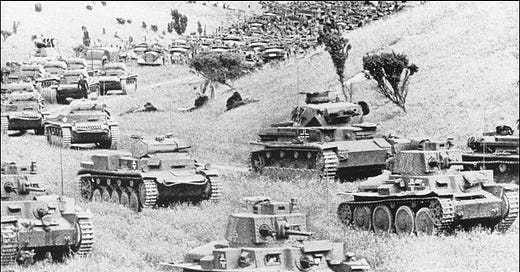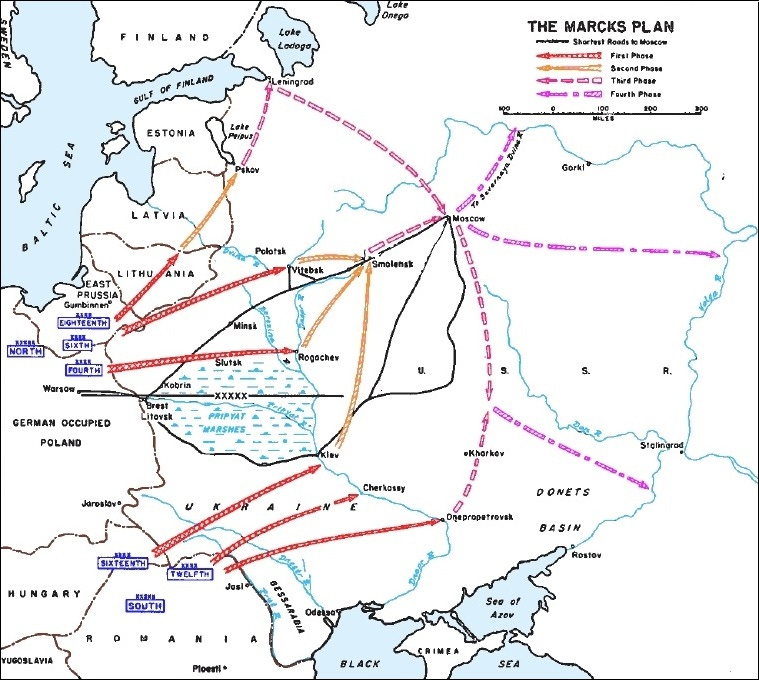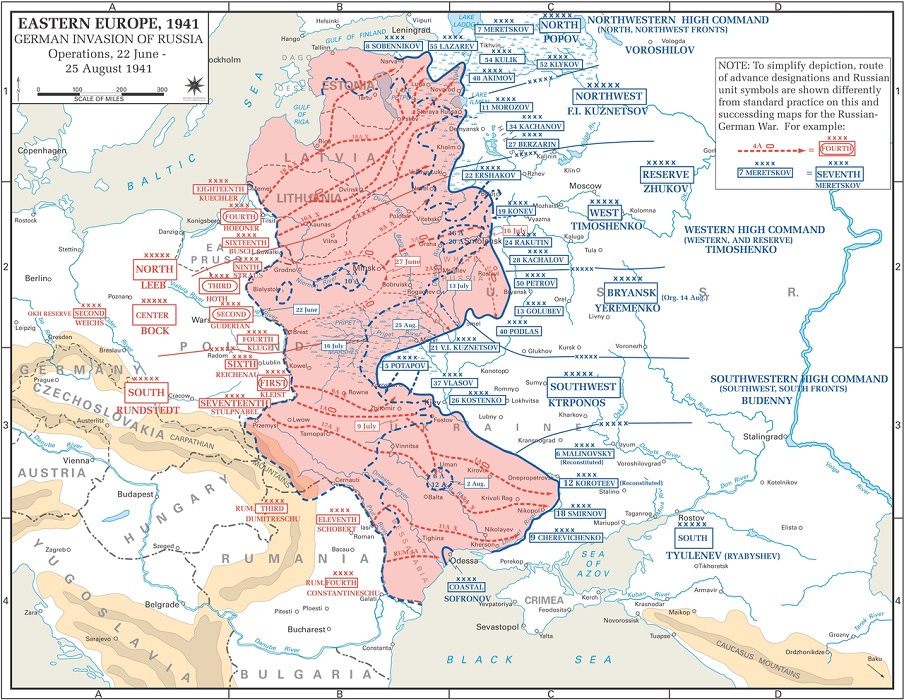Note: This article is being published at the request of Jay Burkett following an exchange of comments about hypothetical military scenarios and historical counterfactuals. It was written some time ago; the version presented here has been revised and updated.
It may well be said that the turning point of the Second World War was reached on the day that Nazi Germany invaded the USSR: 22 June 1941. At that moment, the Grand Alliance (as Churchill called it) of Britain, America and Russia became probable, for it seemed only a matter of time before the United States would enter the war as well. And by December 1941, when the USA did come in, the failure of Germany's drive to the east was obvious to all. The USSR had not been defeated in a single blitzkrieg campaign; indeed, it was the German Army that was fighting for its survival. And the Grand Alliance having become a reality, faced with its overwhelming power Germany could no longer hope to win the war.
But might things have turned out differently? Could Germany have defeated the USSR in 1941? This question has been debated since the war ended in 1945. Those who think that a German victory was impossible offer powerful arguments. They point out that Germany’s military advantage in 1941 was a wasting asset, bound to dwindle and disappear, while the USSR’s military potential was enormous, particularly in alliance with the UK and the USA. Those who think that a German victory was possible tend to point the finger of blame at Hitler, whose meddling, they assert, threw away Germany’s one chance to knock out the USSR.
Whether Nazi Germany could have defeated the USSR at all is a doubtful question, whoever was commanding the former’s armies. If we assume, however, that the Army High Command (Oberkommando des Heeres or OKH) had been given the freedom to conduct Operation Barbarossa as it saw fit, the capture of Moscow and a successful conclusion of the 1941 campaign is conceivable. And indeed, the preliminary invasion plan that was that was drawn up by the OKH in 1940 envisioned just such an outcome. Code-named Otto and known informally as the Marcks Plan after its principal author, it envisioned an operation in four phases, defeating the Red Army in the western USSR, capturing first Leningrad, then Moscow, and finally advancing to the A-A (Arkhangelsk–Astrakhan) line, bringing most of European Russia under German occupation. Two army groups would carry out the offensive, one north and one south of the Pripyat Marshes.
But Hitler was dissatisfied with the Marcks Plan and in his Directive 21 for the invasion of the USSR he amended it to provide three army groups, two of them making the main effort north of the Pripyat Marches with Leningrad and Moscow as simultaneous primary objectives. As a necessary preliminary, the Red Army formations standing in the western USSR would be encircled and destroyed before they could withdraw to the east. The A-A line remained the ultimate, albeit vaguely defined, objective. This revised plan was given the code name Barbarossa.
Operation Barbarossa commenced on 22 June 1941, and the Red Army forces in the western USSR were soon routed, suffering astronomical losses in both men and material. But neither Leningrad nor Moscow was captured and by late July OKH realized that it had seriously underestimated the strength of the Red Army. For every division destroyed, a new one appeared in the enemy’s order of battle. It was true that many of these divisions were hastily organized and poorly trained. Some were formed with personnel drawn from the various branches of the NVKD; others consisted of “workers’ militia” units. Many lacked artillery, antitank guns—even mortars and machine guns. But they fought. And Soviet troops who'd been bypassed or encircled continued to resist tenaciously, posing a worrisome threat to the Germans' vulnerable flanks and lines of communication. It was clear that the Red Army, if down, was not out.
As for the German armies, heavier-than-anticipated casualties and growing supply problems were beginning to make their effects felt. The all-important mobile forces especially—the panzer and motorized infantry divisions—were in urgent need of rest and refitting. An operational pause was clearly necessary so that the armies could be resupplied and reinforced before resuming the offensive. It was during this lull that a strategic dispute between Hitler and the OKH played itself out.
Brauchitsch, the Commander-in Chief of the Army, Halder, the Chief of the OKH, Bock, commanding Army Group Center, and Guderian, commanding Second Panzer Group, believed that an attack on the Moscow axis would compel the enemy to stand and fight, resulting in a decisive battle that would destroy the main body of the Red Army and end with the capture of the Soviet capital. But Hitler disagreed: He desired to capture Leningrad, then switch the main effort to the southern sector of the front. The Führer believed that capturing the economic resources of the Ukraine would irretrievably cripple the USSR, adding that those resources were essential to the long-term German war effort. He also insisted that it was necessary both to eliminate the surrounded enemy forces behind the German front line and to destroy the still-formidable Red Army forces facing Army Group South in the Ukraine. He was deaf to OKH’s argument that victory on the Moscow axis would secure those objectives in any case.
Needless to say, the Führer's opinion prevailed: Army Group North was instructed to resume its advance on Leningrad, and in late August the main effort was switched from the central to the southern sector of the front. Though the Leningrad offensive soon stalled, the Germans scored a resounding victory in the Ukraine. Hitherto the Red Army in that region had put up a stout fight against Army Group South, maintaining its cohesion despite losing ground. But the intervention of Guderian’s Second Panzer Group, descending upon the enemy's rear in the Kiev area, caused the defense to collapse.
The First Battle of Kiev, which ended in the third week of September, cost the Red Army more than 600,000 casualties. But this German success, though impressive, was not decisive. Thanks to the lateness of the season, for the Germans there were no vital objectives within reach east of Kiev. The Russians, however, could still trade space for time, and with mobilization reaching full flood and reinforcements coming in from the eastern USSR, they could still replace their losses. The German main effort was therefore switched back to the Moscow axis, the drive on the capital resuming on 30 September—unsuccessfully, as things turned out.
The most popular Eastern Front counterfactual is based on a German advance to Moscow resuming in late August, after the German armies in that sector had been rested, reinforced and resupplied. At that time, it is argued, Red Army forces on the Moscow front were still in shaky condition and a timely attack by Army Group Center might have smashed them. If so, the Germans would probably have captured both Moscow and Leningrad. The Soviet capital was the nexus of rail and road communications in central and northern Russia. Its fall to the Germans would have isolated the Leningrad region, leading to a more or less automatic collapse of the Red Army in that sector. Then a further eastward advance by the Germans toward Gorki would have menaced the northern flank of Soviet forces in the Ukraine, compelling them to retreat eastward, possibly as far as the Volga.
So goes the counterfactual. Though in strictly military terms even so gigantic German victory would not necessarily have finished off the USSR, the political fallout would surely have been profound. After presiding over such a catastrophic defeat, it's plausible to think that the Soviet regime would have collapsed, perhaps with a cabal of generals putting Stalin and his cronies in front of a firing squad. Or if Stalin managed to weather the debacle, he might have thrown up the sponge, accepting harsh peace terms as the price of survival, preserving the option of renewing the fight another day. Such a German victory in late August-early September 1941, had it happened, would have cleared the way for a near-infinity of alternate histories.
But all such speculations depend on the validity of the claim that a German summer offensive in the Moscow direction would have been successful. And this is doubtful.
Though the first phase of Barbarossa seemed resoundingly successful, the victorious picture bore a smudge. As noted above, it became clear as the German armies advanced that the Red Army possessed much larger reserves than expected. Though in July the armies covering Moscow were relatively weak, reinforcements were pouring in. With the energy of desperation, the Red Army was organizing fresh units—rifle divisions and brigades, tank divisions and brigades, independent tank battalions. Thus every day that the German forces on the central front remained stationary reduced the possibility of a successful offensive toward Moscow. Moreover, the Germans were finding it difficult to replace all their losses, particularly in the vital panzer divisions: An August offensive would have found them a quarter to a third below authorized strength. And it was certain that the attacking German forces would suffer heavy casualties in a Battle of Moscow.
In such circumstances, though it might have been just possible for them to capture the Soviet capital, the exhausted Germans could have gone no farther. Meanwhile the Soviet side would still have possessed a block of liquid military assets: the crack divisions of the Far Eastern Front, freed for deployment westward by the Soviet–Japanese Neutrality Pact, which had been signed in April 1941. Very likely, therefore, a Soviet winter counteroffensive would still have taken place, with the recapture of Moscow as its primary objective. From that point on, German military capability would steadily have declined, while that of the USSR would equally steadily have grown.
There’s one other Eastern Front counterfactual that merits mention: What would have happened if the invading German armies had come as liberators, promising to free the Soviet peoples from the tyranny of Stalinism?
As it happens, Stalin had grave doubts about the USSR’s staying power in a war against Germany. He realized better than anyone that such spectacles as the Five-Year Plan and military parades in Red Square concealed potentially fatal fragilities. The deprivations of the 1930s—crash industrialization, the collectivization of agriculture, the Great Purge—had levied a hideous toll of death and suffering on the Soviet peoples. Stalin knew that he and his regime were widely hated; he had good reason to fear that in the event of a German invasion, the people might turn on the Party. Moreover, he knew that thanks to his purge of its officer corps, the Red Army was quite unprepared for war. Stalin believed that at all costs, war with Germany, however inevitable in the long term, had to be delayed for as long as possible. That was why the Soviet leader took such pains to maintain good relations with Germany between 1939 and 1941, and why he was deaf to credible intelligence concerning Hitler’s real intentions.
But the objection to this counterfactual is simple, indeed decisive: From Hitler’s point of view, such a policy would have made nonsense of the whole Nazi-Soviet War. Germany’s objective was the conquest of Lebensraum—living space—with the USSR as far as the Urals to be colonized by Germans. The surviving native populations were to be reduced to the status of helots: illiterate hewers of wood and drawers of water for the Master Race. Nazi Germany and its leader being what they were, the war could have been fought in no other spirit.
The Nazi-Soviet War turned out as it did because a Soviet victory was by far the most likely outcome. Germany’s failure to deliver an immediate knockout blow to the Stalin regime in the summer of 1941 and the subsequent formation of the Grand Alliance doomed Nazi Germany. Could the Germans have taken Moscow in August or September 1941? Perhaps. But even if they had, the war would still have ended with the Red Banner flying over the ruins of the Reich Chancellery in Berlin.






One other factor made German victory unlikely.
The Russians were able to endure hardship that no western European was willing to endure.
Compare how the Russians fought (and suffered) at Leningrad, Stalingrad and Sevastopol.
No German military force (or German city) put up a similar defense.
Compare the battles of Berlin or Konigsberg. Russians would have fought far harder than did the defenders of those two cities.
The Nazis really did not understand total war (in spite of their willingness to inflict horrendous suffering on others).
Stalin's regime was willing to do anything to survive.
And they had the Russian people (mostly) behind them.
I’ve wondered what would have happened if Hitler had turned on Japan and decisively backed the US after Pearl Harbor. The German sympathizers in the US would have provided a serious lobby at least for nonintervention. Likewise, Ukraine and the Caucasus were ripe for liberation, maybe large sections of Belorussia and Russia too. But as you note, this would have all required Hitler and the Nazis to not be Hitler and the Nazis. And not just philosophically, but in their general contempt for reality. I can’t see any military strategy that could have overcome these weaknesses.